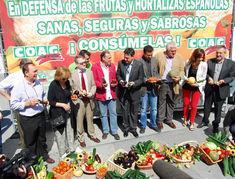
Producers and traders in Europe were outraged this week by European farm commissioner Dacian Ciolos’ announcement of a preliminary fund of €150 million compensation for growers affected by the E. coli crisis.
It had initially offered €150m, but EU Farm Commissioner Dacian Ciolos raised the figure to €210m after coming under pressure from major producers.
The offer is still a fraction of farmers' estimates of their losses, which go as high as €417m a week.
Ciolos was speaking after an extraordinary meeting of the agriculture council in Luxembourg on 7 June. He said: “Following discussion with the council, member states have asked for the figure to be revised upwards. I have given permission for the commission to come back with a revised proposal which will then go to the management committee for a speedy decision, probably at the beginning of next week.”
Compensation has been set at 30 per cent of prices during the reference period of June 2007-2010. “We cannot only take into account losses, but also the budget available,” said Ciolos. “We have to find a balance.”
The source of the outbreak that has killed 26 people and left 2,400 ill is still unknown and scientists and German officials have warned that the origin of the infection might never be found.
Originally, Spanish cucumbers and then German beansprouts had been blamed for the problem.
Ciolos added that the products for which compensation will be applied also have to be agreed and the most affected so far appear to be cucumbers, tomatoes and lettuce but other lines such as courgettes and capsicum have also suffered. “We have to target the products that have been most affected and where there is less capacity for storage,” said Ciolos.
Spain’s farm minister Rosa Aguilar declared: “No, Spain does not see €150m as sufficient.” Her view is shared by her French counterpart Bruno Le Maire.
A generic campaign called for urgently by European trade body Freshfel as well as legions of producer associations EU-wide will take place, Ciolos assured, but not in the format many had hoped for. “The campaign will be in the context of programmes already existent within the EU,” he said. “I have asked that these projects be accelerated so that by the autumn we will have a decision.”
Fresh Produce Consortium CEO Nigel Jenney was outspoken on the nature of any such campaign: “This will be much better organised on a national basis to take account of individual markets’ idiosyncrasies. When the commission has done these sort of campaigns before, they have been pretty bland,” he said.
Another source said: “If the British Leafy Salads Association can’t put together enough money and agree a way forward to promote a certain product range then how on earth is a Europe-wide one going to do that?
“There has not been a robust enough apology from the Germans and sanctimonious people in the media have caused a lot of damage.”
Greyfriars chairman John Smith told FPJ that politicians and the media have been “grossly irresponsible” in handling the “abysmal” situation and had created an “irresponsible and ineffectual response”.
He added that “jaundiced consumers may or may not respond” to a campaign to redress the issue which “demonstrates the fragility of consumer demand”.



